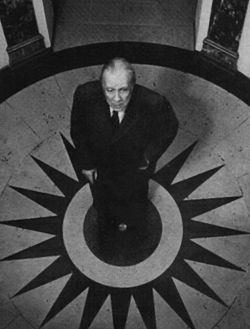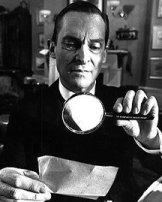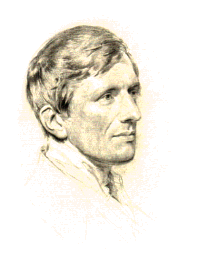My rendition of the Borges classic. You can read the original here.
While returning from the textile factory of Tarbuch and Loewenthal on the fourteenth of January, 1922, Emma Zunz found at the back of the entrance hall a letter dated in Brazil by which she knew her father had died. The seal and the envelope fooled her at first; then she became discomfited by the unknown handwriting. Nine or ten scribbled lines sought to fill up the page; Emma read that Señor Maier had ingested a strong dose of veronal by mistake and died on the third of the current month in the hospital in Bagé. The letter was signed by a companion from her father’s boarding house, a certain Fein O’Fain of the Rio Grande, who could not have known that he was addressing the daughter of the deceased.
 Emma let the paper fall. Her first sentiment was indisposition in her stomach and knees; then she felt blind guilt, unreality, cold, fear; then she wanted it to be the next day already. She understood right afterward that this wish was useless because her father’s death was the only thing that had happened in the world and that would keep happening without end. She retrieved the paper and went to her room. She furtively guarded it in a drawer, as if, otherwise, it would meet other ends. She had already started to see them loom; perhaps she was already as she would be.
Emma let the paper fall. Her first sentiment was indisposition in her stomach and knees; then she felt blind guilt, unreality, cold, fear; then she wanted it to be the next day already. She understood right afterward that this wish was useless because her father’s death was the only thing that had happened in the world and that would keep happening without end. She retrieved the paper and went to her room. She furtively guarded it in a drawer, as if, otherwise, it would meet other ends. She had already started to see them loom; perhaps she was already as she would be.
In the growing darkness, Emma cried until the end of the day of the suicide of Manuel Maier, who was Emanuel Zunz in the old, happy days. She remembered summer vacations on a small farm near Gualeguay, remembered (tried to remember) her mother, remembered the house in Lanús that they auctioned off, remembered the yellow lozenge panes of a window, remembered the prison sentence and the opprobrium, remembered the anonymous letters with the newspaper clipping on “the cashier’s embezzlement,” remembered (but this actually she never forgot) that her father, that last night, had sworn to her that the thief was Loewenthal. Loewenthal, Aaron Loewenthal, previously the factory manager and now one of the owners. Emma had guarded this secret since 1916. She had revealed it to no one, not even to her best friend, Elsa Urstein. Perhaps she was evading profane incredulity; perhaps she believed that her secret was a link between her and her absent father. Loewenthal did not know that she knew; from this small fact Emma derived a feeling of power.
That night she did not sleep; and when the first light outlined the window’s rectangle, her plan had already been perfected. She got that day, which to her seemed interminable, to be like the others. In the factory, there were rumors of a strike; as always, Emma declared herself to be against all violence. At six o’clock, she finished work and went with Elsa to a women’s club which had a gym and swimming pool. They signed in; she had to spell and repeat her name and surname and pretend to enjoy the vulgar jokes which accompanied the review. With Elsa and with the younger of the Kronfusses, she talked about which cinema they would go to on Sunday afternoon. Then they spoke about boyfriends, with no one expecting Emma to speak. She was going to be nineteen in April, but men still inspired almost pathological terror in her ... On returning, she made some tapioca soup and vegetables, ate early, went to bed and forced herself to sleep. In this laborious and trivial way, Friday the fifteenth, the eve of the events, passed.
On Saturday, impatience woke her up. Impatience, not inquietude, and the sole relief of being on that day, at an end. She no longer had to plot and imagine: within a few hours, the simplicity of the events took over. She read in La Prensa that the Nordstjärnan of Malmö was setting sail tonight from pier three; she phoned Loewenthal, insinuated that she desired to communicate (without the others’ knowing about it) something about the strike, and promised to pass by the office at nightfall. Her voice was trembling; the trembling suited an informer. No other memorable event occurred that morning. Emma worked until twelve and fixed the details of a Sunday walk with Elsa and Perla Kronfuss. After having lunch, she lay down and, eyes closed, recapitulated the plan she had plotted. She thought that the last stage would be less horrible than the first and would doubtless provide the taste of victory and justice. Suddenly, alarmed, she got up and ran over to the drawer of the dresser. She opened it; under the picture of Milton Sills, where she had left it the night before, was the letter from Fain. No one could have seen it. She began to read it and ripped it up.
To relate with certain reality the events of that evening would be difficult and perhaps not right. One attribute of the infernal is its unreality, an attribute that at once mitigates and aggravates its terrors. How could one make an action credible when one did not believe who did it? How can one recuperate this brief chaos which, today, the memory of Emma Zunz repudiates and confounds? Emma lived by Almagro, on Liniers street; it is evident to us that she went to the port that evening. Maybe in the infamous Paseo de Julio she saw herself multiplied in mirrors, revealed by lights, and undressed by hungry eyes; but it is more reasonable to conjecture that at first she strayed inadvertently towards the indifferent arcade ... She entered two or three bars and saw the routine and manners of other women. Finally she spoke to the men from the Nordstjärnan. She was afraid that one man, very young, would fill her with tenderness, so she opted for another, coarse and perhaps shorter than she was, for whom the pureness of the horror would not be mitigated. The man led her to a doorway, then a turbid entrance hall, then a steep staircase, then a small room (which had a window with lozenge panes identical to those in the house in Lanús), then to a door which was locked. The grave events were outside of time; and for that reason, the immediate past remains cut from the future; and for that reason, the parts that form the events do not seem consecutive.
At what time apart from this time, in what perplexing disorder of unconnected and atrocious sensations did Emma think but once of the death that motivated her sacrifice? I am of the belief that she thought about it one time, and at this moment endangered her desperate proposition. She thought (she could not but think) that her father had done the horrible thing to her mother which they were now doing to her. She thought with faint astonishment and immediately took refuge in her vertigo. The man, a Swede or a Finn, did not speak Spanish; he was a tool for Emma as she was for him, but she was serving joy and he justice.
Once she was alone, Emma did not immediately open her eyes. On the lamp table was the money the man had left. Emma got to her feet and ripped up the money as she had ripped up the letter. Ripping up money is an impiety, like throwing out bread; Emma repented as soon as she did it. An act of arrogance and on that day ... Fear got lost in her body’s sadness, in her disgust. Her disgust and her sadness were paralyzing her, but Emma rose slowly and proceeded to get dressed. No bright colors remained in the room; the last dusk was becoming worse. Emma managed to leave without anyone’s notice; at the corner, she boarded a train on the Lacroze line which was heading west. Following her plan, she chose the seat all the way at the front so that they could not see her face. Perhaps it consoled her to affirm, in the insipid hustle and bustle of the streets, that what happened had not contaminated matters. She traveled through deteriorating and opaque neighborhoods at once seen and forgotten and got off at one of the turnings of Warnes. Paradoxically, her fatigue came to be a strength since it forced her to concentrate on the details of the affair and conceal its background and its end.
Aaron Loewenthal was, according to everybody, a serious and reliable man; but his few intimates knew him as greedy. He lived upstairs in the factory, alone. It was set up in a run–down area for fear of thieves; he kept a large dog in the factory’s courtyard and in the drawer of his desk, everybody knew, a revolver. Last year he had cried with much decorum over his wife’s unexpected death (a Gauss who bore a good dowry!), but money was his true passion. To his personal embarrassment, he was less talented at making it than keeping it. He was very religious, believing himself to have a secret pact with the Lord which excused him from acting good in exchange for orations and prayers. Bald, corpulent, in mourning garb, with steamed–up glasses and a blond beard, he stood by the window expecting the confidential report of worker Zunz.
He saw her push the gate (which he had left half–open on purpose) and cross the dark courtyard. He saw her give a small start when the still–fastened dog barked. Emma’s lips were moving like those of someone praying in a low voice; tired, they repeated the sentence which Señor Loewenthal would hear before dying.
Things did not happen the way Emma Zunz had foreseen them. Since yesterday’s early morning she had dreamt of many things, holding the firm revolver, forcing that miserable man to confess his miserable guilt, and explaining that intrepid stratagem that would allow Divine Justice to triumph over the justice of men (not by fear but by being an instrument of Justice, she did not wish to be punished). One bullet in the middle of the chest would then seal Loewenthal’s fate. But the events did not occur thus.
Before Aaron Loewenthal, more than the urgency of avenging her father, Emma felt the urgency of punishing the outrage she had suffered because of him. She could not but kill him after this meticulous disgrace. Nor did she have the time to spare for theatrics. Seated and shy, she asked Loewenthal for forgiveness and invoked (as an informer) the obligations of loyalty, mentioned certain names, said she understood others and cut herself off as if fear had won out. She managed to make Loewenthal leave for a glass of water. When he, incredulous but indulgent of such a fuss, returned from the dining room, Emma had already taken the heavy revolver from the drawer. She squeezed the trigger twice. His considerable body collapsed as if the explosions and the smoke had ripped him up; the glass of water broke; his face showed both fear and anger; the face’s mouth insulted her in Spanish and in Yiddish. The bad words did not cease; Emma had to fire another time. In the courtyard, the tethered dog broke out in barking, and an effusion of sudden blood remained on the obscene lips and stained his beard and clothes. Emma began the accusation she had prepared (“I have avenged my father and they will not be able to punish me...”), but she did not finish because Señor Loewenthal was dead. She never knew whether he was able to understand.
The mounting barks reminded her, however, that she could not rest. She disarranged the couch, unbuttoned the cadaver’s jacket, removed his bespattered glasses and left them on top of the file cabinet. Then she took the phone and repeated what she would repeat so many times, with these and other words: Something unbelievable has happened ... Señor Loewenthal made me come by with the strike as a pretext ... He took advantage of me and I killed him.
As it were, the story was unbelievable, but it prevailed upon everyone because it was substantially true. Emma Zunz’s tone was real, her decency was real, her hate was real. And the outrage which she had suffered was also real: only the circumstances, the time, and one or two names were false.
 Friday, January 4, 2008 at 02:09
Friday, January 4, 2008 at 02:09  Many winters ago I offended an acquaintance when, in a moment of unforgivable cavalierness, I declared the Sherlock Holmes stories to be "works written for children." Rarely have I made a comment that I so regret. In point of fact, I had loved the stories as I suppose all young boys do, and was particularly taken by the magnificent screen embodiment of Holmes by the late and sensationally talented Jeremy Brett. If you have never seen these productions, which ran on PBS's Mystery! from 1984 to just before Brett's death in 1995, I cannot possibly recommend them more highly. Of the 56 stories and four novellas, rediscovered and readored by me the last few years, 41 episodes (with one episode combining elements of two stories) were filmed and are viewable on 21 discs.
Many winters ago I offended an acquaintance when, in a moment of unforgivable cavalierness, I declared the Sherlock Holmes stories to be "works written for children." Rarely have I made a comment that I so regret. In point of fact, I had loved the stories as I suppose all young boys do, and was particularly taken by the magnificent screen embodiment of Holmes by the late and sensationally talented Jeremy Brett. If you have never seen these productions, which ran on PBS's Mystery! from 1984 to just before Brett's death in 1995, I cannot possibly recommend them more highly. Of the 56 stories and four novellas, rediscovered and readored by me the last few years, 41 episodes (with one episode combining elements of two stories) were filmed and are viewable on 21 discs.



